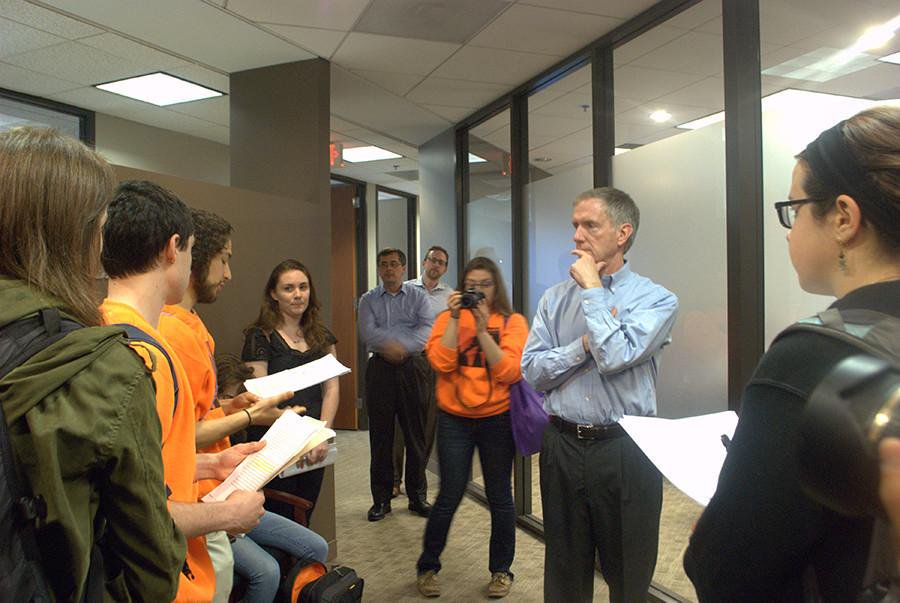Faculty debate free expression, peaceful demonstration policy in first Senate
Daily file photo by Sylvana Caruso
Members of Fossil Free NU read a statement to chief investment officer Will McLean in 2015. The University created a socially responsible investment committee to improve communication and transparency with the Board of Trustees.
October 5, 2017
Members of Faculty Senate discussed concerns about Northwestern’s policy on free expression and peaceful demonstration during its first meeting of the quarter Wednesday at the Pancoe Life Sciences Pavilion.
The policy, last amended in January, describes the “parameters University community members must adhere to when engaging in free expression and peaceful demonstration.” Communication Prof. Robert Hariman said several professors told him the current definitions of disruption and demonstration are too broad, which restricts free expression on campus.
“The consensus is that the definition of disruption and demonstration is absolutely too broad and that it’s going to lead to bad cases and bad policies,” said Hariman, who is the Faculty Senate president.
The University’s current definition of disruption and demonstration “refers to engaging in assemblies, demonstrations, picketing, protests, counter-protests, sit-ins, or any other exercise of free expression on or near the University campus.”
English Prof. Jeffrey Masten said the current definition conflicts with the University’s goal to support freedom of speech on campus.
“I hope that we can see that this is a very broadly-drawn definition,” he said. “It creates free expression not as the center and foundation of what we do as a university, but actually as an aberrance.”
Hariman said the Faculty Rights and Responsibilities committee is working on revising the policy.
Classics Prof. Robert Wallace said the policy’s current definition implies all demonstrations are disruptive, so the two acts should not be grouped together.
“A demonstration is fine — in a peaceful way — but what we don’t want is disruption,” he said. “So just get rid of the word disruption in the definition.”
Earlier in the meeting, Kellogg Prof. Ravi Jagannathan said the Advisory Committee on Investment Responsibility had nothing new to report. The committee, officially chartered last academic year, was created to promote transparency in investment decisions. The group will consider community proposals and recommend changes to the Board of Trustees’ own investment committee.
Later, senators discussed revisions made over the summer to the University’s Policy on Non-Retaliation. The policy prohibits retaliation against any community members for reporting alleged improper or illegal activities in an effort to encourage people to report them.
Linguistics Prof. Jennifer Cole said the policy was revised to be consistent with other University policies.
“The revision was intended to broaden the scope of the non-retaliation policy so that it would extend to all members of the university community,” Cole said.
Correction: A previous version of this story misquoted English Prof. Jeffrey Masten. He said he thought the broad nature of the disruption and demonstration policy makes free expression an aberrance. The Daily regrets the error.
Email: [email protected]
Twitter: @gerardoa_7


